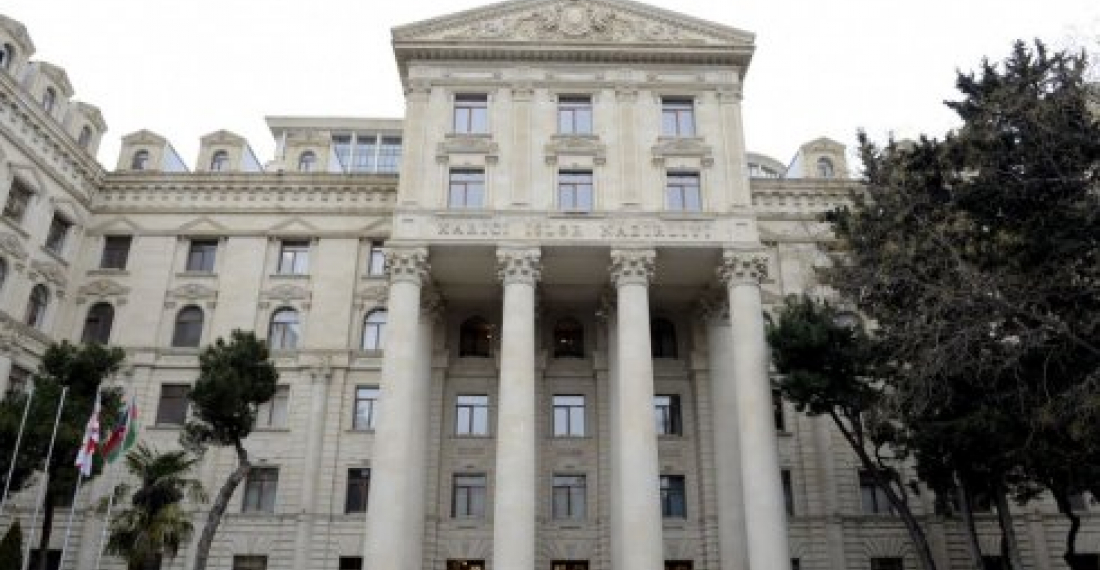The Azerbaijani Ministry of Foreign Affairs yesterday (6 August) issued a statement in response to a speech made by Armenian Prime Minister Nikol Pashinyan on Monday (5 August) in Stepanakert. The MFA’s statement accuses the Prime Minister’s “aggressive statements” of “clearly [contradicting] the spirit and the essence of the negotiations on the settlement of the Armenia-Azerbaijan Nagorno-Karabakh conflict conducted for many years, including the recent discussions of the meetings between Armenia and Azerbaijan”.
The statement referred to the speech as a “major blow to the negotiation process mediated by the OSCE Minsk Group co-chairs,” and that the Prime Minister’s remarks do not correspond to Armenia’s appeal for an “exclusive peaceful settlement of the conflict”.
The MFA’s statement also addressed the 2050 Armenian development goals, which Pashinyan declared during Monday’s speech, saying that the country will not be able to “achieve its ambitions for the next 30 years hiding behind its aggressive policy”. It accused the Armenian leadership of using the goals to deceive the Armenian people, advocating that Armenia “[evaluate] the current situation and [normalise] its relations with neighboring countries”.
The Armenian Ministry of Foreign Affairs has responded to the statement by the Azerbaijani MFA, criticising it as “a stark demonstration of failure to adhere to basic rules of civility and decency, incapacity to sustain civilized norms of conduct between nations, especially amongst parties engaged at the highest level in highly complex and sensitive process of conflict resolution.” The retaliatory statement accused the Azerbaijani MFA of “personal attacks” and a “culture of intolerance and hatred towards the Armenian people”.
The Armenian MFA also accused the Azerbaijanis of failing to “understand the context and content” of the speech, defending Pashinyan’s rhetoric as addressing “the pan-Armenian agenda of advancing unity, solidarity, development and prosperity for Armenia, Artsakh and Diaspora”. It defended Armenia as the only ‘guarantor’ for those in Nagorno-Karabakh, condemning Azerbaijan’s unwillingness to involve the de facto leaders of the region in negotiations. It reaffirmed Armenia’s continued commitment to a “strictly peaceful resolution of the conflict” but that any solution “should be acceptable to the peoples of Artsakh, Armenia and Azerbaijan”.
The Head of Foreign Policy Affairs Department of the Azerbaijani Presidential Administration, Hikmet Hajiyev, weighed in yesterday by saying, “By making this destructive and provocative statement, the Armenian side again puts the region face to face with threats and risks, and intentionally escalates the situation to divert public attention from its domestic issues”. Hajiyev accused Pashinyan of contradicting his “recent statements that he 'cannot speak on behalf of Nagorno-Karabakh',” and of misleading the international community In the negotiations.
Observers are concerned that the spat may undermine the feasibility of Pashinyan’s new government to make headway on the Nagorno-Karabakh peace process, and that it may increase the likelihood of ‘war by accident’, with Azerbaijan abandoning faith in a peaceful settlement to the conflict.
Sources: commonspace.eu and agencies
Photo: Azerbaijani MFA (picture courtesy of Azertag website)







